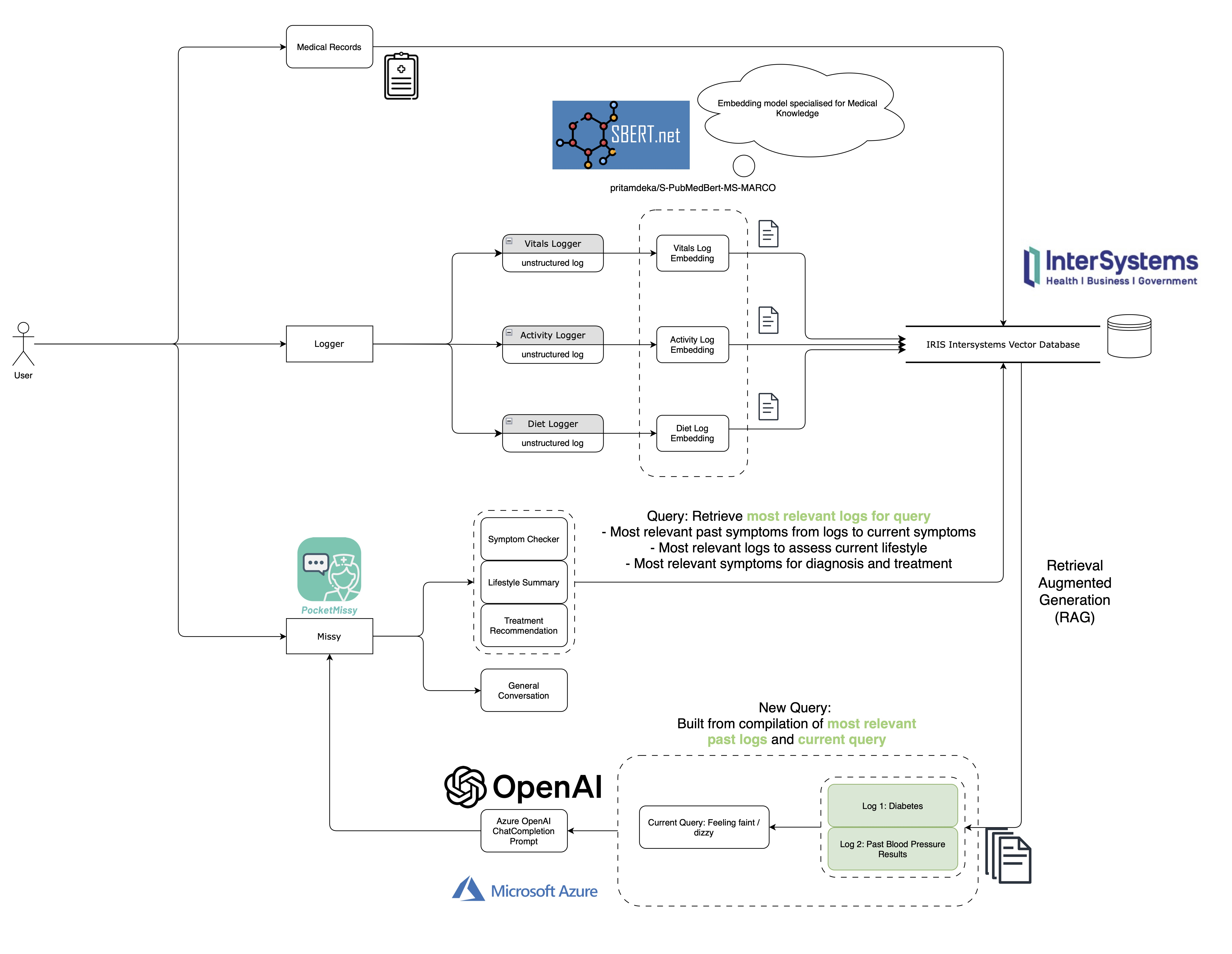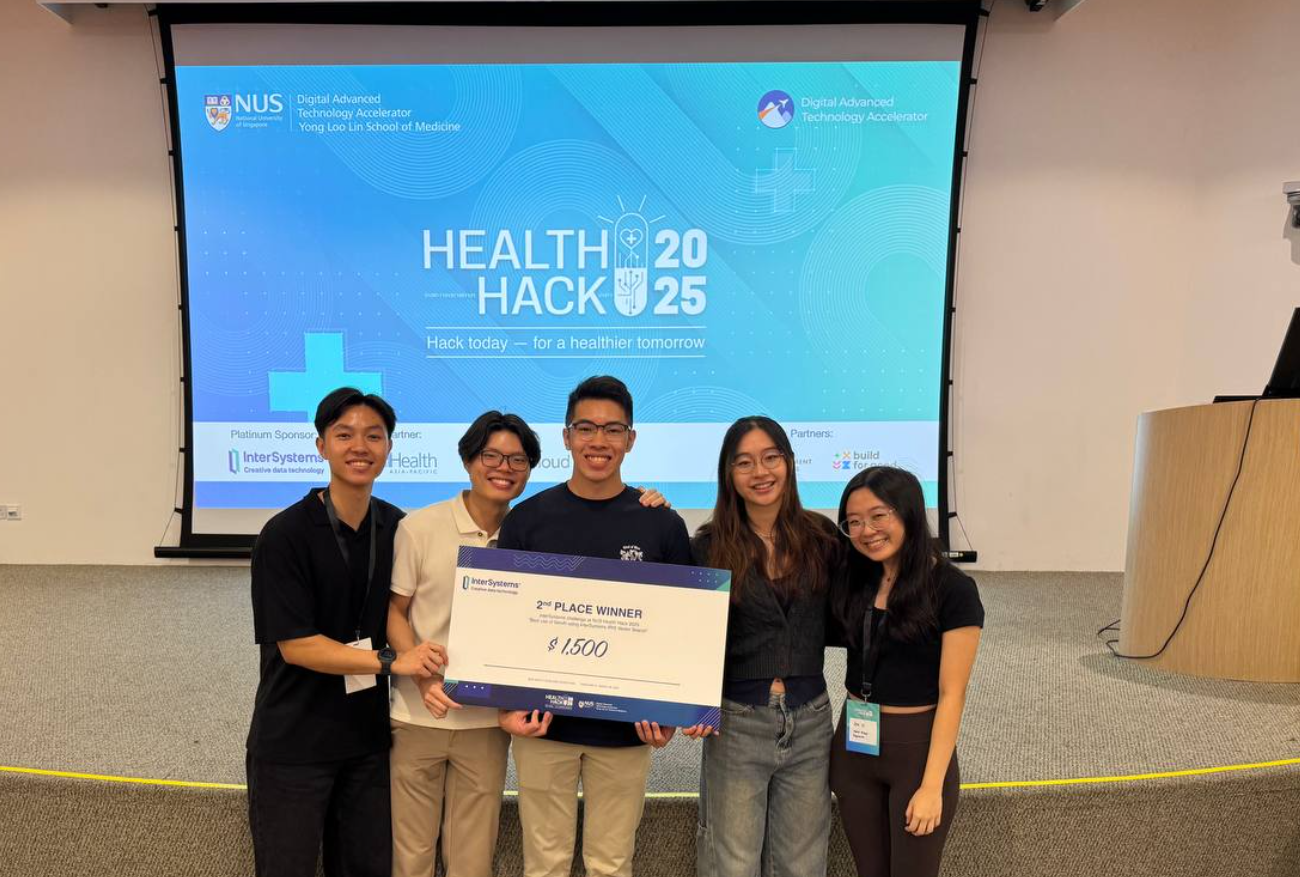
Pocket Missy
Last updated: Jul 1, 2025
Overview
Pocket Missy is an AI-powered healthcare companion app designed to simplify and personalize healthcare for seniors in Singapore. Developed during HealthHack 2025, this project unifies multiple healthcare services into a single intuitive platform. At its core, Pocket Missy leverages advanced vector search, Retrieval-Augmented Generation (RAG), and Azure OpenAI integration to provide personalized health insights and actionable recommendations.
The Challenge
Healthcare for seniors is often fragmented, with vital services, appointments, prescriptions, and records scattered across different apps. This creates friction for elderly users and leads to underreporting of symptoms, which delays care. Clinicians, too, face cognitive overload, often unable to tap into rich lifestyle and sensor data due to time constraints.
Key Features
-
Unified Health Dashboard
Consolidates vitals, diet, activity, and medical history into one view for users and healthcare providers. -
“Ask Missy” Multilingual Chatbot
An AI assistant that taps into user data to deliver contextual, personalized responses. Modes include:
• Symptom Checker
• Medical Summary
• Treatment Recommendations
• General Health Queries -
Proactive Health Monitoring
Automatically logs key events like falls or unusual symptoms using wearable sensors and user inputs. -
AI-Powered Data Retrieval
Combines IRIS vector search and RAG-based prompt engineering to serve data-relevant, accurate outputs via Azure OpenAI.
Technical Stack
- Frontend: React Native (TypeScript)
- Backend: Flask (Python)
- Database: InterSystems IRIS with vector search
- NLP: SentenceTransformer (
pritamdeka/S-PubMedBert-MS-MARCO) - LLM Integration: Azure OpenAI API
System Architecture

Workflow at a Glance
- Users log health data via sensors or manual input
- Data is embedded into vector format and stored in IRIS
- Pocket Missy uses vector search + RAG to retrieve relevant data
- A prompt is sent to Azure OpenAI to generate personalized insights
Demo
Challenges faced
-
First Experience with LLMs & Prompt Engineering
- Steep learning curve designing effective prompts for medical use cases
- Balancing accuracy, safety, and user-friendliness in chatbot responses
- Multi-language support added complexity to prompt structure and handling
-
Working with InterSystems IRIS Vector Search
- Difficult to run IRIS database locally – required significant setup and system resources
- Embedding unstructured data into vector format and managing query performance was non-trivial
- Integration with RAG pipeline and Azure OpenAI needed custom data flow handling
-
Time Constraints During Hackathon
- Rapid prototyping under tight deadlines
- Limited time to fully optimize database and model performance
Despite these challenges, we gained hands-on experience with RAG architecture, semantic search, and building LLM-driven healthcare applications.
Recognition
🏆 Winner – HealthHack 2025 Intersystems Challenge
📍 Built at NUS to improve elderly care and reduce healthcare friction.
The Team

- Allexis Yu – NUS Year 2 Business Analytics
- Gerard Goh – NUS Year 2 Business Analytics
- Lee Xin Yi – NUS Year 3 Medicine
- Ng Jun Wei (me!) – NUS Year 3 Civil Engineering
- Ryan Tan – NUS Year 3 Business & Business Analytics (DDP)
Learn More
- GitHub: https://github.com/awpbash/healthhack
- Special thanks to the organisers at NUS Yong Loo Lin School of Medicine, judges at GovTech, and sponsors at Intersystems.